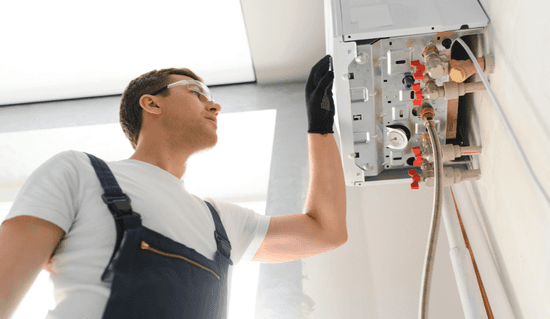
Boilers play a crucial role in providing heating and hot water for homes and businesses, especially during the colder months.
However, like any other mechanical system, boilers require regular maintenance to ensure they operate efficiently, reliably, and safely.
Neglecting boiler maintenance can lead to reduced efficiency, increased energy costs, and even potential safety hazards. However, because of these safety hazards, the majority of boiler maintenance must be done by a gas safe registered professional.
In this blog, we'll explore the importance of boiler maintenance and provide practical tips on how to keep your boiler running smoothly.
Boiler maintenance is essential for several reasons:
To keep your boiler running smoothly, it's essential for a professional to perform regular maintenance tasks, including:
Annual Boiler Servicing:
Schedule an annual boiler service with one of our qualified and gas safe registered heating engineers. During the service, our engineer will inspect and clean the boiler's internal components, check for any signs of wear or damage, and ensure that it operates safely and efficiently.
This service is one of the most important things you can do to keep your boiler working properly.
Good times to get a boiler service include summer, early autumn or after the Christmas winter rush. You’ll want to avoid peak times like early winter, as this is when a lot of people notice issues when they start to turn their heating on after the warmer weather dies down.
Professional Cleaning
As mentioned, a professional clean is important. This makes sure the boiler is cleaned and functioning properly, without the risk of accidentally tampering with or knocking something potentially dangerous during the cleaning.
The heat exchanger is a critical component of the boiler responsible for transferring heat from the burner to the water.
Over time, the heat exchanger can become fouled with dirt, debris, or limescale, reducing its efficiency. Regularly inspecting and cleaning the heat exchanger is important to maintain optimal performance.
PowerFlush and Clean the System:
Over time, sludge, rust, and other contaminants can accumulate in the boiler's pipework and radiators, restricting water flow and reducing efficiency. If you notice any coldness on your radiators or reduced heat, consider getting a professional to power flush the system. This will remove debris and sludge buildup, and then be followed with adding an inhibitor to prevent future corrosion.
DIY Boiler Maintenance Tips
In addition to professional servicing and maintenance, there are several DIY tasks you can perform to keep your boiler running smoothly. Remember, if in doubt, call a professional, a service can cover a lot of these issues...
Check and Adjust Boiler Pressure:
Low boiler pressure can indicate a leak in the system or a problem with the pressure relief valve. Check the boiler's pressure gauge regularly and adjust it to the manufacturer's recommended levels if necessary. If you notice persistent pressure fluctuations, consult our qualified engineers to diagnose and address the issue.
Inspect and Test Safety Devices:
Ensure that all safety devices, such as the pressure relief valve, temperature controls, and carbon monoxide detector, are functioning correctly. Test these devices regularly and replace them if they show signs of wear or malfunction.
Check for Leaks:
Inspect the boiler and its pipework for any signs of leaks, corrosion, or water damage. Call a professional and address leaks promptly to prevent further damage to the boiler and surrounding areas.
Monitor Fuel Consumption:
Keep track of your boiler's fuel consumption and energy usage over time. Sudden increases in fuel consumption or energy bills could indicate underlying issues with the boiler's efficiency or performance.
Regularly Check for Warning Signs:
Be alert to any unusual noises, odours, or changes in boiler performance, such as reduced heating output or fluctuating water temperatures. These could be symptoms of issues that could grow worse if ignored.
Bleed Radiators:
Air trapped in radiators can prevent them from heating evenly, resulting in cold spots and reduced heating efficiency. Bleed your radiators regularly to release trapped air and restore optimal heating performance.
Keep the Boiler Area Clean and Clear:
Ensure that the area around the boiler is clean, clutter-free, and well-ventilated. Avoid storing items or blocking airflow around the boiler, as this can impede its operation and increase the risk of overheating or malfunction.
Follow Manufacturer's Instructions:
Make sure you read the manufacturer's instructions and guidelines for operating and maintaining your specific boiler model especially if you plan on doing a DIY check over. Follow recommended maintenance procedures and intervals to ensure you have a boiler that will perform at its best for the longest time possible.
Book a Boiler Service Today
As specialists in 7 different trades, and available nationwide 24/7, it’s easy to get an Able Group expert out to your home or business at a time that suits you.
So if you’re due a boiler service, need a repair, or require an installation, call us today on 03301082265
More Info on Boilers
You can also find more info on boilers in our previous blogs:
Why You Need an Annual Boiler Service
Everything You Need to Know About Getting Your Boiler Serviced
The Best Type of Boiler for You